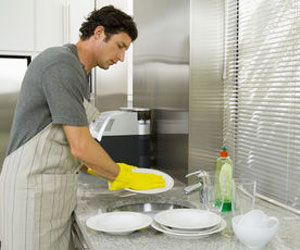Articles
 COUPLES who share housework duties run a higher risk of divorce than couples where the woman does most of the...
COUPLES who share housework duties run a higher risk of divorce than couples where the woman does most of the...
RedHotPie Editor | September 28 2012
Higher risk of divorce when men do housework, Norwegian study finds
COUPLES who share housework duties run a higher risk of divorce than couples where the woman does most of the chores, a Norwegian study sure to get tongues wagging has shown.
The divorce rate among couples who shared housework equally was around 50 per cent higher than among those where the woman did most of the work.
"The more a man does in the home, the higher the divorce rate," Thomas Hansen, co-author of the study entitled Equality in the Home, said.
Researchers found no, or very little, cause-and-effect. Rather, they saw in the correlation a sign of "modern" attitudes.
"Modern couples are just that, both in the way they divide up the chores and in their perception of marriage" as being less sacred, Mr Hansen said, stressing it was all about values.
"In these modern couples, women also have a high level of education and a well-paid job, which makes them less dependent on their spouse financially. They can manage much easier if they divorce," he said.
There were only some marginal aspects where researchers said there may be cause-and-effect.
"Maybe it's sometimes seen as a good thing to have very clear roles with lots of clarity ... where one person is not stepping on the other's toes," Mr Hansen suggested.
"There could be less quarrels, since you can easily get into squabbles if both have the same roles and one has the feeling that the other is not pulling his or her own weight," he added,
In Norway, which has long tradition of gender equality, child-rearing is generally shared equally between mothers and fathers (in seven out of 10 couples), said Mr Hansen, speaking notably from a park where he was minding his children.
But when it comes to housework, women in Norway still account for most of it in seven out of 10 couples.
The study also pointed out however that those women were largely satisfied with the situation, and their overall happiness was very close to those women who lived in "modern" couples.
Source: perthnow.com.au
The divorce rate among couples who shared housework equally was around 50 per cent higher than among those where the woman did most of the work.
"The more a man does in the home, the higher the divorce rate," Thomas Hansen, co-author of the study entitled Equality in the Home, said.
Researchers found no, or very little, cause-and-effect. Rather, they saw in the correlation a sign of "modern" attitudes.
"Modern couples are just that, both in the way they divide up the chores and in their perception of marriage" as being less sacred, Mr Hansen said, stressing it was all about values.
"In these modern couples, women also have a high level of education and a well-paid job, which makes them less dependent on their spouse financially. They can manage much easier if they divorce," he said.
There were only some marginal aspects where researchers said there may be cause-and-effect.
"Maybe it's sometimes seen as a good thing to have very clear roles with lots of clarity ... where one person is not stepping on the other's toes," Mr Hansen suggested.
"There could be less quarrels, since you can easily get into squabbles if both have the same roles and one has the feeling that the other is not pulling his or her own weight," he added,
In Norway, which has long tradition of gender equality, child-rearing is generally shared equally between mothers and fathers (in seven out of 10 couples), said Mr Hansen, speaking notably from a park where he was minding his children.
But when it comes to housework, women in Norway still account for most of it in seven out of 10 couples.
The study also pointed out however that those women were largely satisfied with the situation, and their overall happiness was very close to those women who lived in "modern" couples.
Source: perthnow.com.au

